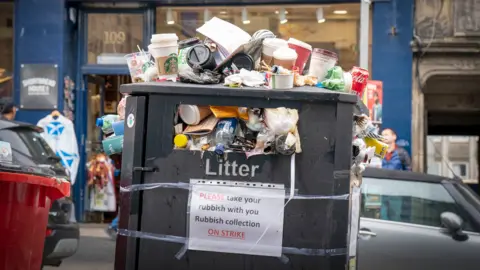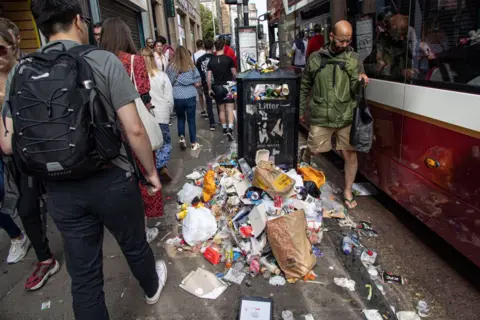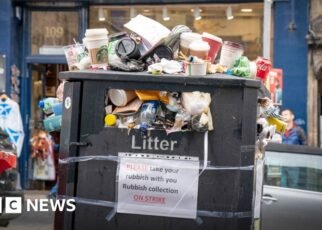[ad_1]
 PA Media
PA MediaCouncil leaders have made a new pay offer in a bid to avoid strike action by waste workers.
Staff in 26 of Scotland’s 32 council areas plan to walk out from 14 – 22 August after rejecting two previous wage increases by local government body Cosla.
Cosla said extra funding from the Scottish government meant it was now able to offer a 3.6% increase for all grades, with a rise of £1,292 for the lowest paid, equivalent to 5.63%.
The GMB, Unison and Unite unions will now consider the offer and announce on Monday if the planned strikes will be called off.
Cosla’s resources spokesperson Katie Hagmann said: “This offer reflects what trade unions have asked for and we hope that they will now be prepared to call off the strikes while they put that offer to their members.”
The unions had rejected the previous offers, saying they were insufficient to deal with the rising cost of living, despite them being above the rate of inflation.
Workers had been offered a 3.2% rise, backdated to April.
However, Finance Secretary Shona Robison said more money for a “strong offer” had been found on Thursday.
Unison’s head of local government in Scotland, David O’Connor, said it was frustrating that talks had again gone to the wire before strike action was due to take place.
He said: “Our local government committee will consider this revised offer on Monday, and we will decide whether or not it is sufficient to suspend the waste and recycling strikes.
“However, Unison is by far the largest union in local government and we must make sure that any pay deal works for all council workers.”
GMB Scotland confirmed a revised offer from Cosla had been received at 16:30 on Friday, and that it would be be discussed by its local government committee on Monday morning.
However, Keir Greenaway, senior organiser in public services, said the decision to accept the offer or any other would be taken by members, adding: “Our local government committee will meet to discuss the detail of the revised offer on Monday and, if it is potentially acceptable, will suspend our industrial action and ballot our members.”

Council unions will give serious consideration to the new pay offer and decide whether to suspend next week’s bin strikes on Monday.
But will it be enough?
Councils argue the new offer is as good as it gets. It was made possible after the Scottish government provided some additional funding.
Unions will consider the details of the offer carefully – it means an improved rise or all council workers with a greater rise for the lowest paid.
One question is whether unions think there is any realistic possibility of a further improvement if strike action, now or in the future, goes ahead.
They may decide to suspend next week’s action as a token of goodwill while they consult their members on the offer.
But they will also be aware that the threat of another bin strike during the Edinburgh Festival was a very powerful weapon.
There will be a lot for the unions to weigh up over the weekend before they reach their decisions.

‘Limit of affordability’
The Scottish government said it recognised the importance of supporting “meaningful dialogue” to reach a pay deal and avoid industrial action.
Mrs Robison said: “I asked my officials to work at pace with local government officers to understand what an improved negotiating envelope may look like.
“All parties, including Cosla, trade union leaders and political group leaders have engaged constructively with that process.
“Against an extremely challenging financial landscape, the Scottish government has identified additional funding to support Cosla to make a strong offer.”
She said the enhanced deal was the “absolute limit of affordability” and had required “difficult decision-making”.
Ms Robison added: “I welcome that Scotland’s council leaders have made a strong offer and we await the outcome of local government union considerations.”
 Getty Images
Getty ImagesThe strikes are unlikely to be averted if the unions turn down another deal.
That would mean parts of Scotland could see a repeat of scenes from the summer of 2022, when a strike among refuse workers in Edinburgh spread elsewhere in the country.
It lead to streets in the capital being littered with rubbish as hundreds of thousands of visitors descended on the city for the August festival season.
Public Health Scotland was forced to declare a health warning due to an accumulation of waste in urban areas.
It was eventually resolved in early September, but only after an intervention from then-first minister Nicola Sturgeon.
[ad_2]
Source link




